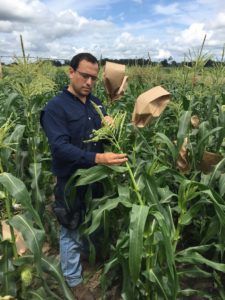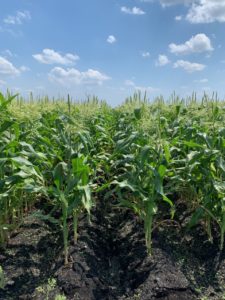Jan 5, 2023High tech helps UF breed tastier sweet corn
University of Florida (UF) scientists are using high-tech practices to improve the characteristics of sweet corn at the UF Institute of Food and Agricultural Sciences’ (UF/IFAS) Sweet Corn Genomics and Breeding lab.
They’re also participating in a national research effort that could help bring more interest in improving sweet corn compared to field corn, which receives exponentially more research attention, from funding devoted to non-sweet varieties and other resources that include acreage for field trials.


At the Gainesville lab, scientists are studying ways to accelerate sweet corn breeding while providing consistency through the seasons despite variations in heat and rainfall, particularly in south Florida, which grows corn in the fall, winter and spring.
“We want to develop materials that are stable across the years, because, ultimately, a grower will only plant something that is consistently good,” said Marcio Resende, assistant professor of corn and potato genomics and breeding, who heads the facility.
Testing and evaluation tools are being developed to aid breeding, including interpreting information from photos. Instead of a researcher measuring a plant’s diameter in the field, a computer can examine a photo and make a prediction.
National muscle
UF is participating in a national research effort to improve sweet corn breeding technology. The $7.5 million project, which began in 2018, is funded from a USDA specialty crop research initiative grant and also involves the University of Wisconsin, Washington State University, Iowa State University and the USDA.
One aspect is predicting yield stability. Relying on computer predictions could provide more accurate information, accelerating the process.
“One way to help the breeding process is to understand the types of genes that lead to characteristics that are beneficial to Florida growers,” Resende said. “Disease is always an issue in Florida. We have a lot of pressure from disease agents.”


While some research, including disease resistance, is shared by both types, sweet corn growers’ needs are unique and focus on flavor, eating quality, nutrition and other characteristics.
“When you talk about eating quality and flavor and nutrition, not as much work has been done there,” he said. “Generally, over the decades, there has been a lack of investment in sweet corn research, in our view.”
Cracking the code
Through the multi-agency project, researchers are sequencing the sweet corn genome, which has already been done for field corn. Scientists are developing prediction models allowing DNA extraction from plant leaves or seeds prior to planting.
For some traits influenced by major-effect genes, a researcher can analyze the plant’s DNA in a population and identify these genes. The researchers can avoid or minimize field screening for these traits, such as disease resistance. This knowledge can also accelerate cultivar development by guiding the transmission of these genes to other adapted varieties, Resende said.
“We are trying to learn more about the genes that are involved in starch biosynthesis,” he said. “This knowledge can guide the selection of sweeter or less sweet types of corn.”
The research is providing a foundation not only for public breeding, but also for private breeding efforts. University scientists collaborate with seed companies, which evaluate UF’s genetics and develop hybrid seeds.


“It is extremely important to have assistance from the University of Florida in developing seed varieties that will work in our tropical environment. We also have our own set of problems when it comes to pests and disease.
The combined research is also studying cold germination, eating quality, consumer preferences and nutritional properties, plus an economic analysis component designed to gain a broad understanding of the sweet corn industry.














